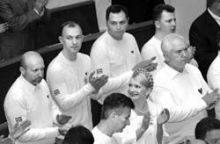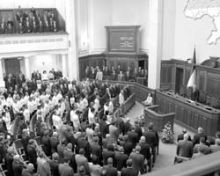From elections to elections: this has been the main characteristic-the engine and helm of the political process in Ukraine for the past 10 years. At the same time, it is the main obstacle to Ukraine’s more progressive movement toward the civilized rules and benefits that various political forces unstintingly promise in all kinds of Ukrainian elections. Western observers often reproach us by saying: “Elections cannot be an excuse for shortcomings; you should not think all the time only about your own popularity.”
Last Thursday saw the finishing touch to the 2006 election campaign: a new parliament was formed out of five political forces. Will politicians (and society) be able this time to avoid the exhausting scenario of a never-ending election race? Will they be able to work without considering the next electoral test? These questions remain unanswered, but the specter of a new election (a reelected parliament or presidential elections in 2009) is increasingly often appearing in the statements of political players and commentaries of experts.
For instance, many political scientists predict that the just-formed Verkhovna Rada is unlikely to last its five-year term. They say it will not stand the coalition test, while direct participants in the political process are looking ahead and demanding that some likely rivals of the current head of state immediately drop their presidential ambitions. Shall we say: the elections are over, long live the elections?
Last Thursday the Verkhovna Rada adjourned until June 7. Our Ukraine, Yulia Tymoshenko’s Bloc, and the Socialists will continue to “forge the chain” of program documents aimed at cementing a “democratic coalition.” They are supposed to complete everything by June 7, and then the country will at last see during the second session that our politicians know how to reach agreements.
Still, one should not pin too much hope on this. Experts are convinced that we are in for a lot of scandals and shakeups in the coalition, as a result of which the coalition may acquire a totally different color. It will be no surprise if, say, the current favorites of the process, not the Party of Regions, will be calling on its parliamentary colleagues to cease their infighting and get down to their normal legislative activity. Still, both sides will be trying to win points for a new contest. Or won’t they? Can we say that a new election campaign has begun in Ukraine? The Day posed these questions to a number of political scientists.
OPINIONS
Vitaliy BALA, director, Situations Modeling Center:
“Professional politicians begin to prepare for a new election right after the last one has ended. Already on Jan, 31 I said that the political war in Ukraine had not yet begun. It has now begun. Whereas a week ago we were witnessing a war of political declarations, now we are seeing a war of political deals about forming a coalition.
“As for Yulia Tymoshenko’s assurances that she does not want to be president, this reminds me of the fairy tale by Khoja Nasreddin, who promised the Shah to teach his donkey to speak in 20 years’ time. Until that time either the Shah or the donkey will have died or something else will have happened.
At first glance, these three years will fly by very fast, but the situation may change radically within six months. We may sink into a very serious systemic economic crisis, and then no government, no matter who may have formed it, will be able to hold on to power. In that case, there will definitely be a reformatting of the coalition, which will lead to a revision of both political and economic interests. We will then have a very complicated situation. You know, whenever people ask me when it will be better, I answer: it was better yesterday.”
Volodymyr MALYNKOVYCH, director, Ukrainian branch, International Institute of Humanitarian and Political Studies:
“Naturally, this date — 2009 — primarily concerns relations between Yushchenko and Tymoshenko. Apparently, the president is afraid of Tymoshenko as a potential rival. If not for this, Yushchenko would not have to agree to an Orange coalition. But Tymoshenko is even more dangerous in the opposition. Therefore, the presidential election factor is already affecting the formation of a coalition and will continue to do so until 2009. This will be especially evident in a year’s time, when Our Ukraine will have even more friction with BYuT than today. But I don’t think Tymoshenko will be relegated to the opposition because she can win over more electors in these two years, and this is easier to do in the opposition than in the government. In the latter case, one has to confirm their authority by concrete deeds.
This will be especially evident in a year’s time, when Our Ukraine will have even more friction with BYuT than today. But I don’t think Tymoshenko will be relegated to the opposition because she can win over more electors in these two years, and this is easier to do in the opposition than in the government. In the latter case, one has to confirm their authority by concrete deeds.
So this factor is influential, but I wouldn’t say that the presidential elections have already begun because in a parliamentary-presidential republic the 2009 elections will not be as important as what is going on now, when a government is being formed to be headed by a prime minister, who in fact wields more power than the president of the country.”
Kost BONDARENKO, director, Institute of National Strategies:
“I think the 2009 elections will only start after all posts are distributed after the 2006 elections and players take their positions in the political arena: then it will become clear who occupies which office, who owns certain resources, and who can count on what.
“I consider Tymoshenko’s announcements that she will not be running for the presidency in 2009 as a political ploy — she can always retract them by making other statements.
“The next three and a half years are going to be very difficult. There will be many crises, primarily in the energy sector. These in turn can spread to the steel industry and others. There may be a showdown in the Crimea, verbal clashes over NATO, etc. Political camps are going to reposition themselves: former allies will turn into enemies, and vice versa.”
Viktor NEBOZHENKO, political scientist:
“The 2009 elections have already begun because a crucial conflict has not been resolved: which side will Ukraine take, who will be the leading political group, and who, to put it crassly, will be the elite? Neither the presidential nor parliamentary elections in 2004 and 2006, respectively, provided an answer. So we can say there is a real likelihood of early presidential or parliamentary elections. The point is our country is in a state of suspension and does know where to go — East or West, it is not clear which group is stronger or weaker.
“It doesn’t matter much that they are unable to forge a coalition or that someone stole a million from someone else. Political scandals are just one level of the problem, while Ukraine’s uncertainty about fundamental values and domestic and foreign policy vectors is another matter altogether. An election is in fact a way to determine to what extent voters are ready to embrace the fundamental values of their country. There’s nothing tragic about this.”
Ihor LOSEV, Associate Professor, Department of Cultural Studies, National University of Kyiv-Mohyla Academy:
“I think if the much-talked-about coalition is finally formed on Tymoshenko’s conditions, there will no presidential campaign so far. If it fails to be formed on her conditions, then the campaign will kick-start immediately.
“As for the Party of Regions, its members are now thinking things over. They expect a crisis in the fall, which will give them everything on a silver platter. Incidentally, they are openly alarming the public with the prospect of an economic slump. Obviously, the ‘regionals’ will do their utmost to turn the current situation to their advantage.
“As for the next three years, the economic situation may deteriorate so much that, despite electoral considerations, it will become necessary to adopt unpopular emergency measures. Reforms will be carried out because of dire need, not as a result of deliberate and target-oriented actions.”








